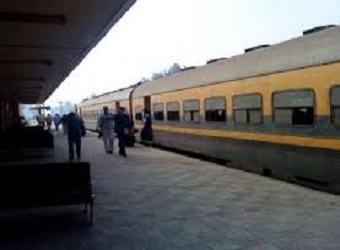On Sunday the House of Representatives approved amendments to the law governing the Egyptian Railway Authority (ERA), giving a green light to private sector companies to build, manage, operate and maintain the railway network.
The amendments give the ERA the right to establish joint-venture companies that can be listed on the stock market.
Parliamentary Speaker Ali Abdel-Aal described the move as “a crucial step” in relieving the problems — “huge debts, outdated operating systems and dilapidated locomotives” crippling the ERA.
He stressed, however, that the changes did not amount to privatisation of the railway network and were fully in line with Article 32 of the constitution which allows the private sector to operate public utilities for up to 15 years at a time.
The approval of the amendments came days after a deadly train collision in Beheira governorate left 12 dead and tens of injured.
Prosecutor-General Nabil Sadek has ordered an examination of the trains’ black boxes in an attempt to determine the cause of the crash.
A committee of experts in engineering and railways from several institutions, including the Armed Forces Engineering Authority and the State Railway Authority, has been formed to investigate the incident.
Initial investigations suggest the crash was caused when a mistake in track changes led to a passenger train being on the same track as a cargo train.
President Abdel-Fattah Al-Sisi has charged Ibrahim Mahlab, the presidential aide for mega-projects, to form a committee to review the status of the railway network and develop it.
Between 2004 and 2016, 13,539 train accidents occurred on the network according to the Central Agency for Public Mobilisation and Statistics (CAPMAS). In 2016 alone, 1,249 accidents were reported. Egypt’s railways need massive upgrading. According to Hani Sobhi, professor of railway engineering at Ain Shams University, safety on Egyptian trains has been compromised “by the systematic failure to maintain equipment”.
Egypt’s railways need massive upgrading. According to Hani Sobhi, professor of railway engineering at Ain Shams University, safety on Egyptian trains has been compromised “by the systematic failure to maintain equipment”.
Osama Okail, professor of road and railway engineering at Ain Shams University, claims the entire domestic railway network is moribund and “needs to be radically upgraded”.
Eighty-five per cent of the network still uses mechanical signalling systems.
“Signals at crossings still depend on the telephone. Ninety per cent of engines still run on diesel. The sector is long overdue an overhaul. Modern electrical signals need to be put in place and diesel engines should be replaced with electric ones,” says Okail.
Addressing MPs following last week’s accident Minister of Transport Hisham Arafat said: “The real problem is not the engines or carriages but signals and infrastructure. Eighty five per cent of the signalling system depends on employees.”
“Some 98 per cent of train accidents in the last 30 years were caused by the outdated signalling system,” claimed Arafat.
He added that upgrading the network would cost $1 million a kilometre.
The network has remained all but unchanged since the 1950s.
“From 1950 until today the length of the network has been the same — 5,200km. It used to carry 440 train journeys per day, transporting 10 to 12 million passengers annually. In 1970 the same network had 490 trips a day, carrying 22 to 25 million passengers. Now there are 922 train journeys timetabled daily, and 350 million passengers use the network in the course of the year,” Arafat said.
Egypt’s railway network is among the world’s oldest. It transports 500 million passengers annually, an average of 1.4 million passengers each day, according to ERA.
According to Arafat, LE55 billion has been allocated for the development of Egypt’s railway infrastructure in a five-year overhaul programme. In addition, “a new high speed line is being constructed linking the ports of Ain Sokhna and Alexandria at a cost of $4 billion.”
The idea of allowing the private sector a role in running the railways was first mooted in August when a train crash in Alexandria left 42 people dead. At the time Arafat said there was an urgent need for new legislation to allow the private sector to participate in upgrading rail services.
“The ERA is expected to do everything, from operating, constructing and investing in the rail network to ensuring it is maintained. It is overstretched and overworked. We need to introduce the private sector to the industry,” Arafat said in a televised interview in August.
Last year the ERA entered into a deal with US-based General Electric to supply 100 new locomotives and refurbish 81 old engines. The $575 million deal includes a 15-year technical support contract and training programmes for more than 275 engineers and technicians.
Source: Ahram online


